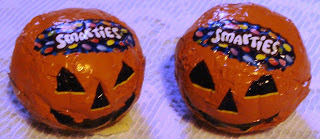
onight is Hallowe'en when, as the old ballad says, the fairy forces ride... It's the Eve of All Hallows (or All Saints) Day, when ghosts, spirits and witches can walk abroad, along with all kinds of ghoulies and beasties (three-legged or otherwise) and things that go bump in the night... But, according to legend, you can keep the dark at bay by ensuring a fire burns through the night...
All Saints Day was one of the great festivals of the Medieval Christian church, but Hallowe'en and its traditions seems much more pagan. It's the Eve of Samhain, the last night of the Celtic Year, before the start of winter, when crops had already been gathered in, cleansing fires were lit, and animals slaughtered and their meat preserved for the months ahead. At this time people looked to the past and future, and considered ageing and death, and the circle of life.
 |
| Shine a light! Jack-o'-Lantern candles. |
These days fancy dress, parties, and
trick or treating seem to be the order of the day, but but there are
all kinds of customs associated with Hallowe'en, many of them
connected with foretelling the name of one's future wife or husband.
Church bells were rung to keep away evil spirits, and in days gone by
lanterns lit for a similar reasons were carved from turnips, rather
than the pumpkins used today.
 |
| I knitted a Hallowe'en tea cosy! |
I would suggest you mark the occasion
by lighting a candle an reflecting on the summer that has gone, and
the winter that lies ahead, and thinking about the good things in
life, and the people you have known. You could enjoy a warm and
spicy celebratory meal of course – pumpkin soup perhaps, and baked
apples (with sultanas and golden syrup), cook up some pumpkin soup, or
carrots .. something orange and spice would be suitable... and a
glass of wine. And you could listen to Fairport' Convention singing
Tam Lin here (and the rest of the Leige and Leaf album). And if your
nerves are up to it you could curl up with a spine-chilling ghost
story, but I'm afraid I can't recommend anything, because spooky tales
aren't my thing!
 |
| More Jack-o'-Lanterns -sadly, I can't eat chocolate, but I bought these last year because they looked so sweet, and the family ate them. |





